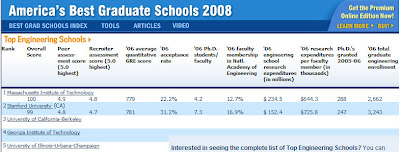For instance, one of the most popular sources for Grad School Rankings is the US News magazine. US News publishes a yearly list ranking various graduate programs from Fine Arts to Engineering. The rankings don't change a whole lot over the years. For instance the overall Engineering rank of the University of Wisconsin-Madison has been either 14 or 15 for the last 5-6 years. US News generates revenue, by convincing readers to purchase their magazine. Universities don't really improve or deteriorate on a year to year basis. Also two of the most important measures according to US News are peer assessment and recruiter assessment, which are highly subjective measures. So do take these with a pinch of salt. Here is a sample ranking from US News:

Another point I want to make about rankings is that while a university may be highly ranked in a broad field, it may not be the best place to study all sub-fields in that broad field. An example is that the University of Wisconsin-Madison's EE program is ranked 14th in the country, but for Power Electronics it's program is much better than those of higher ranked universities. (This is based on courses offered, the number of faculty, the reputation of the faculty members and their rate of publishing research). So if you are interested in a specific sub-field, a smarter idea is to actually look for conferences or journals in that area and find people who publish frequently. (An even better way would be to look for people whose papers are cited by other researchers.) These prominent professors usually attract a lot of research funding, and equally a lot of employers too, whether in the industry or academia.
The other prominent ranking source (and one that I think is a little more reliable) is the National Research Council (NRC). NRC Rankings are produced every 10 years. NRC rankings can also be customized, so that you can attach weights to specific criteria that you care more about.
One resource I found back in 2001 was a compendium of university rankings from the University of Illinois. The good folks at UIUC have put together a list of ranking sources for many fields and countries in one place. If you are looking for information on university ranks for Canada, UK or India, this is the webpage to visit.
Choosing universities is a very complex task. There are many factors that aren't so obvious to people outside America. The US is a very large country, with variations in weather, affluence, crime rates and degree of industrialization (and hence the number of jobs). If you can, keep these things in mind when you are choosing universities too. Proximity to the industry you want to be employed in can be important in some cases.




2 comments:
Great initiative Saket
Just drifted on to this page while surfing randomly through blogs.
Take care
Manish
Thanks Manish. :) Hopefully I can keep plugging in some more posts here.
Post a Comment